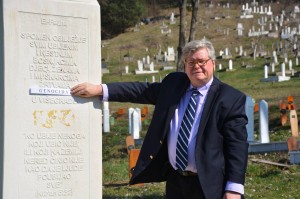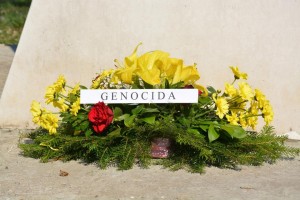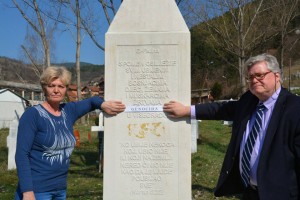David Pettigrew Solidarity with Bakira and victims of the Bosnian Genocide
I was in Višegrad recently to express my solidarity with Bakira Hasečić who is working, among many other projects, on preventing the destruction of the Pionirska Street house in Višegrad. The Pionirska Street house is one of the two houses in Višegrad where, in June 1992, the Lukić cousins trapped approximately 60 innocent Bosniaks inside the house and burned them alive. The house located in the Bikavac settlement was completely destroyed.
Therefore the Pionirksa Street house is the only remaining evidence of the crimes that the ICTY ruled to be the “worst acts of inhumanity that a person may inflict upon others.” “These horrific events,” the Court concluded, “stand out for the viciousness of the incendiary attack, for the obvious premeditation and calculation that defined it, for the sheer callousness and brutality of herding, trapping and locking the victims in the two houses, thereby rendering them helpless in the ensuing inferno, and for the degree of pain and suffering inflicted on the victims as they were burnt alive. There is a unique cruelty in expunging all traces of the individual victims which must heighten the gravity ascribed to these crimes. (from the ICTY Judgment Summary for Milan Lukić and Sredoje Lukić, 20 July 2009)
January 23, 2014, the Višegrad Municipality carried out its decision to remove the word “genocide” from the memorial to the victims of the Višegrad genocide. They forcibly entered the private Muslim cemetery under the protection of more than 50 heavily equipped police and with an electronic grinder they removed the word Genocide from the memorial.
Now, the municipality of Višegrad seeks to destroy the Pionirska Street house under the guise of a municipal road-widening project. I met with the OSCE last week and they implied that, in spite of local protests, negotiations and relatively clear indications from the OSCE and OHR that the house should not be destroyed, the fate of the Pionirska Street house still hangs in the balance. The outcome is uncertain.
The community of returnees have undertaken a heroic effort to restore the house to its former condition. The basement where the civilians were murdered would eventually become a museum/memorial and the upper floors of the house would house a family.
When I met with local community activists and religious leaders they suggested that conditions for returnees had worsened because of the new power of the SDS political party (the party of Radovan Karadžić) in Višegrad, including the new Mayor Slaviša Mišković. In addition to the removal of the word “genocide” from the memorial they reported that under SDS leadership there has been an increase in the harassment of Bosniak returnees, including police patrols, surveillance, investigations, and summons.
If the municipality succeeds in the destruction of the Pionirska Street house they will have succeeded finally in what the court referred to as “expunging all traces of the individual victims,” and in thereby further expunging the traces of the genocide in Višegrad. Ultimately, the threat to destroy the house is just one aspect of the policy of genocide denial as well as of the culture of intimidation and discrimination directed at nonSerb returnees in Republika Srpska.



